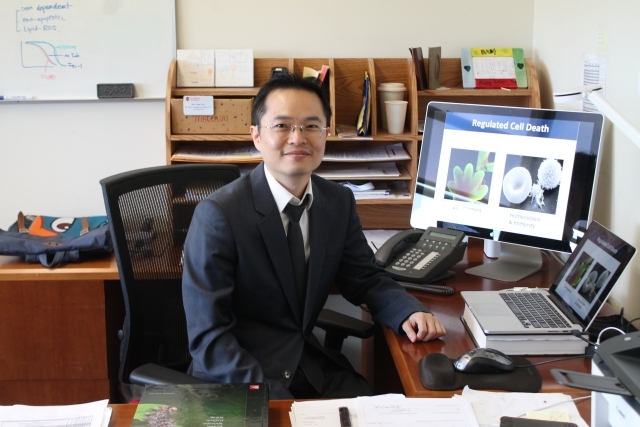
Though Wan Seok Yang, Ph.D., is only in his second year at St. John’s University as an assistant professor of Biological Sciences, he has already been awarded his first National Institutes of Health (NIH) grant for the research proposal, “Determination of Cell Death Pathways Activated in ALS.” The amount of the award is $492,000 and extends for three years until 2020, at which point Yang may apply for another NIH grant with a larger funding amount. The current grant is part of the Support of Competitive Research (SCORE) Pilot Project Award (SC2) program.
Yang’s research examines processes of active cell death and how failures in cell death regulation lead to neurodegeneration. While working at Columbia University as an associate research scientist, Yang and his colleagues identified and named the phenomenon of ferroptosis, which is the form of cell death his laboratory studies now. In this next level of his research, Yang has connected this form of cell death to Amyotrophic Lateral Sclerosis (ALS), commonly known as Lou Gehrig’s disease. ALS is a progressive neurodegenerative disease that is typically fatal. According to Yang, more than 90 percent of ALS patients die within five years after being diagnosed with the disease. His goal is to learn how to prevent cell death and neurodegeneration in the motor neurons that control muscles in the body and are affected by ALS. By identifying the pathway for motor neuron death in ALS, he proposes to add a cell death inhibitor to that pathway and thereby delay or even prevent neurodegeneration.
The NIH grant will cover lab supplies and indirect costs related to Yang’s research, which requires induced stem cell (iPS) models derived from ALS patients’ skin. “This stem cell model is the most advanced cell culture model of ALS that ensures the physiological relevance of the research outcomes,” said Yang. The funding will also benefit the graduate and undergraduate students who gain research experience in Yang’s lab as part of SJU’s commitment to student research.
“Considering that Wan is only in his second year at SJU, this is a fantastic accomplishment,” said Ales Vancura, Ph.D., professor and chair of Biological Sciences.
Yang holds an M.A. and Ph.D. in Molecular and Cellular Biology from Korea Advanced Institute of Science and Technology. His B.A. in Biological Sciences is also from Korea Advanced Institute of Science and Technology. He came to St. John’s as assistant professor in 2015.
